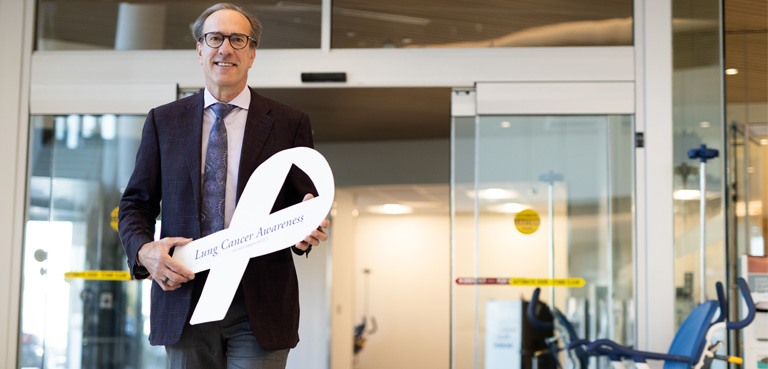Reflections from Michael R. Gieske, MD, Director of Lung Cancer Screening at St. Elizabeth Healthcare
This Lung Cancer Awareness Month, we celebrate the courage of those facing lung cancer and the advancements in early detection and screening. Lung cancer has long been known as one of the deadliest cancers. But thanks to the dedicated teams at St. Elizabeth Healthcare and evolving technology, lung cancer is increasingly treatable. More people are surviving — even thriving — after a lung cancer diagnosis. Our commitment to complete, compassionate care is helping thousands across Kentucky and beyond.
Kentucky Leads the Nation in Lung Cancer Screening
Kentucky is a state deeply impacted by lung cancer. It now ranks second in the nation for lung cancer screening uptake, just behind Massachusetts. While the national screening rate is only 4.5%, St. Elizabeth has achieved a remarkable 60% rate for eligible individuals. This success has put Kentucky and St. Elizabeth Healthcare on the map. Our innovative approach and leadership in combating this disease have gained attention at the World Conference on Lung Cancer and the World Health Organization’s (WHO) International Lung Cancer Consortium Conference.
Through partnerships with the National Committee for Quality Assurance (NCQA), St. Elizabeth is piloting a groundbreaking HEDIS metric(Healthcare Effectiveness and Data Information Set). This metric could revolutionize lung cancer screening across the U.S. and help ensure that we detect lung cancer early.
Finding Lung Cancer Early
Lung cancer can affect anyone. At St. Elizabeth, we’re going after it and catching it early when the chance of cure can exceed 90%. Since its launch in 2013, the St. Elizabeth Lung Cancer Screening Program has screened nearly 50,000 individuals. We’ve detected close to 750 cases of lung cancer. Thanks to these efforts, we found 75% of these cancers in stage I — the earliest stage. That gives patients the best chance for long-term survival.
Over the past nine years, St. Elizabeth has identified more than 4,000 lung cancer cases. For the first time, we’re seeing more early-stage lung cancers (57% I and II) than late-stage cancers (43% III and IV). This progress is largely unprecedented and is a testament to our teams working hard to advance screening efforts and our incidental lung nodule program.
For many, early detection means a new outlook. People diagnosed with advanced stages are now living for decades, enjoying more time with loved ones. And for those diagnosed at earlier stages, the chance of cure can exceed 90%. Through program coordination and support from our Nurse Navigators, St. Elizabeth provides cost-effective, efficient care that minimizes risk and maximizes outcomes.
Leading the Way with Innovation
Innovation drives our success. At St. Elizabeth, cutting-edge innovations like robotics, artificial intelligence (AI), biomarkers, risk assessment models and research expand access and enhance the precision of lung cancer screening. We’re pushing legislative policy and advocacy forward. And we’re advocating for research funding and fostering healthier, smoke-free communities across Kentucky and Indiana.
Low-Dose CT Screening
Low-dose CT screening is available for people aged 50-80 who have smoked within the last 15 years and have a 20-pack-year history (e.g., one pack per day for 20 years). To schedule a screening, talk to your primary care provider or contact St. Elizabeth at (859) 301-4072. For more information, visit stelizabeth.com/lung.
The Role of Smoking Cessation in Preventing Lung Cancer
Approximately 80% of lung cancer cases are linked to cigarette smoking. St. Elizabeth is committed to supporting those ready to quit. Kentucky ranks fourth in the nation for adult smoking rates, making tobacco cessation even more critical. Our Freedom From Smoking® program, a seven-week course, helps people build lasting habits for a smoke-free life. To learn more or register for the next session, call (859) 301-5570.
A Community United Against Lung Cancer
Throughout November, look for the white ribbons shining on our hospitals to honor Lung Cancer Awareness Month. These ribbons symbolize our collective mission to bring hope, fight lung cancer and ensure a brighter future for all affected. Together, we’re building a future where more people survive — and thrive — after a lung cancer diagnosis.

